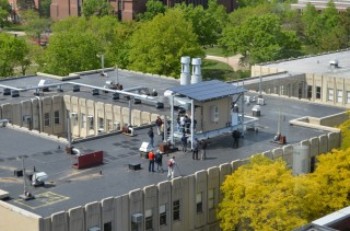The computing center at Rutgers’s School of Engineering will be powered by 16 polycrystalline solar panels. For this purpose, researchers will use Parasol to determine how computing and data processing can be managed effectively with the use of electricity generated through solar power. The project is being directed by two Computer Science professors, Thu D. Nguyen and Ricardo Bianchini.
 Parasol at Rutgers
Parasol at Rutgers
Bianchini has already received $1.5 million from the National Science Foundation for research on energy efficiency in computing and also received a three-year grant for $1.5 million from Google to come up with solutions to reduce energy usage in internet data centres. This project is being led by Bianchini with a team of professors from University of Michigan, University of California at Santa Barbara and the University of Virginia. The 16 solar panels are made of a stainless steel frame with each panel having the capacity to house batteries, transformers, computers and other electrical equipment. The facility was funded by Michael J. Pazzani who is the Vice President of Research and Economic Development.
The Parasol has been located exactly under the solar panels. This set up provides cooling without the need of compressors and chillers which use up high amounts of energy. The system continuously monitors the temperature and consumption of energy in the facility, and switches off those devices which are not in use. When solar energy is not available, the Parasol that is connected to the grid will use brown solar energy. Apart from this system, researchers have also developed the GreenSlot and GreenHadoop, which are load-scheduling software systems that help in maximum efficient usage of energy.
Source: http://www.rutgers.edu